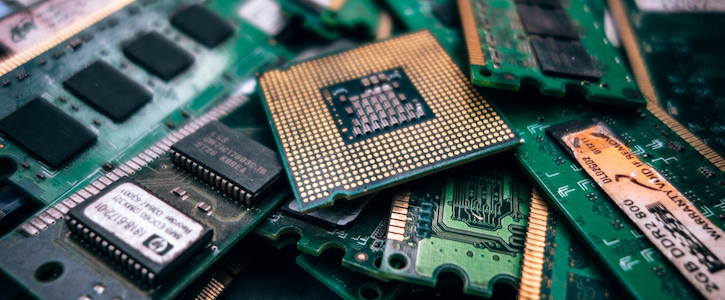As Apple Eyes Health Chips, a Look at 4 Little-Known Sensor Projects
What is already brewing in the healthcare sensor space?

When CNBC reported yesterday that Apple has spent the summer quietly searching for leading minds to explore making custom health chips, the news was somehow not surprising. After all, the $1 trillion tech company has repeatedly expressed, or at least hinted at, a growing commitment to many facets of the evolution of healthcare. And for products like the Apple Watch, it has welcomed third-party development of sensors.
Although Apple already makes chips for its technologies, some of which monitor health data, hiring a team of health sensor experts could make the company stand out in an increasingly crowded space, as CNBC noted.
But perhaps the most intriguing aspect of this news has little to do with Apple and its business efforts. It could be that Apple’s deeper dive into a complex area has the potential to further accelerate the market, bringing innovations that have remained locked away in academia and startup offices into the clinic sooner than imagined.
>> READ: How Apple Brings Health Records to the Smartphone
So, what are these innovations, and what do they aim to accomplish? Well, there are many experts who are exploring health sensors for tech new and old — for wellness, disease, chronic pain and more. Some live in smartphones, while others enter the body or attach to medical devices. And with little variation, the goal of many of these relatively underground projects is to help patients better manage their health, whether that be through data control, more precise data collection or real-time alerts.
Whether Apple will pursue any of these paths is unclear. Whether the company’s apparent intentions will have any effect on the innovators already in this space also remains a question. But it’s worth looking at what’s going on here right now.
We’ve covered many studies and funding rounds centered on microprocessors and sensors, and those we haven’t detailed probably outnumber the ones we have. But to provide the audience with a feel for the kinds of projects that Apple could feasibly be going for, we’ve rounded up four of the more interesting and potentially meaningful projects in this space. (These are also less reported than, say, a phenomenon like the digital pill.)
1. The Injectable Sensor That Monitors Alcohol Use
Gauging alcohol consumption in real time, this biosensor wirelessly connects with wearable devices to provide long-term insights. University of California, San Diego bioengineers developed the tool in hopes that it can treat alcoholism and diseases that worsen when a patient drinks. The chip is tiny enough to be injected under the skin with a needle, allowing no chance for it to fall off the body. Researchers are just now preparing to test it on animals.
2. A Two-Pronged Smart Bandage
Tufts University researchers have created what they say is the first bandage to use sensors to both monitor wound healing and deliver drugs as necessary. So far, the technology has been tested only in the lab, but its flexible, thin material and high-power microprocessor provide plenty of room for optimism. “It will improve health outcomes and reduce cost of healthcare,” one researcher said.
3. Solving a Birth Defect with an Implant
Do robots get under your skin? Because this one does — literally. Researchers from the University of Sheffield and Boston Children’s Hospital at Harvard Medical School have designed a device to treat a birth defect in which the upper and lower components of the esophagus are not connected. The robotic implant uses two kinds of sensors to measure tissue tension and displacement, leveraging a control unit to enable clinician monitoring. The strength of the sensors could cut down the need for multiple surgeries.
4. An Inhaler That Decreases Usage
In Louisville, Kentucky, some patients with asthma used their inhaler 78 percent less often thanks to this innovation from Propeller Health. What’s more, study participants also enjoyed a 48 percent increase in asthma symptom-free days. It all hinges on a small device that attaches to a rescue inhaler, using sensors to accurately record data in a way unseen before. Despite its technological complexity, the device was designed in a way that patients could install it without any outside help.
Get the best insights in healthcare analytics directly to your inbox.
Related
FDA Approves Wristband EKG Reader for Apple Watch
A New Injectable Sensor Monitors Alcohol Use in Real Time
No, Apple Watch Can’t Detect Irregular Heart Rhythms with 97% Accuracy (Yet)